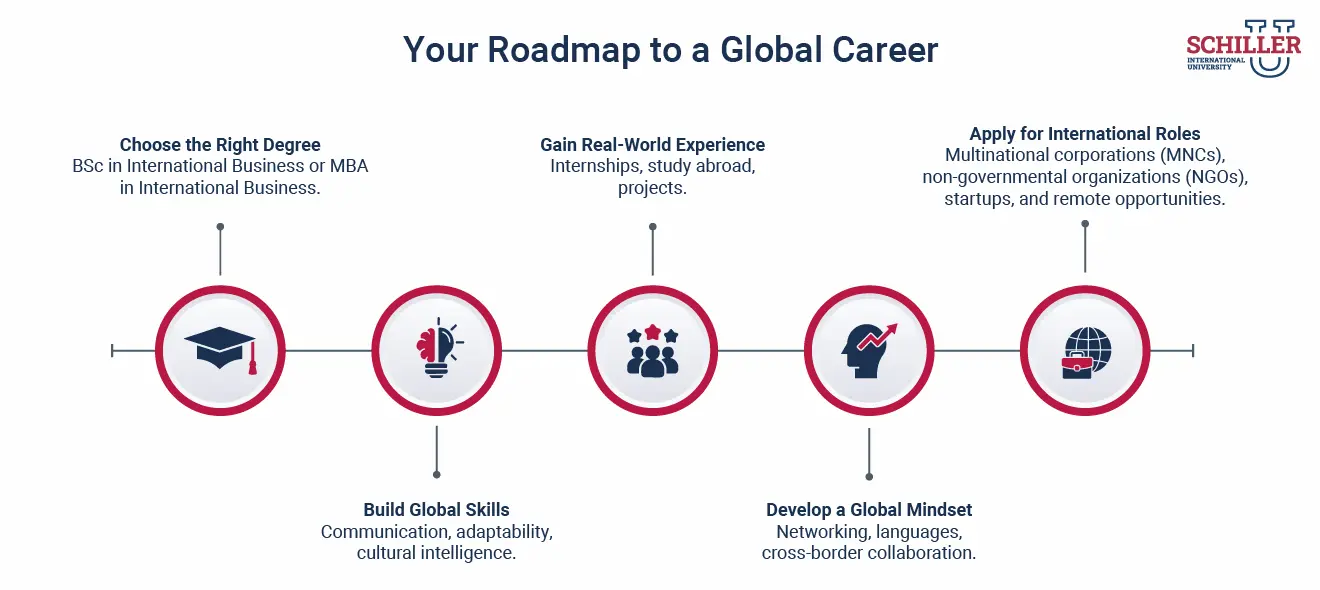The idea of an 'international career' once meant working abroad or traveling frequently for meetings. In 2025, it is far broader and far more accessible. Technology has made it possible for even small teams and solo entrepreneurs to operate across continents. Every product, service, and partnership now connects to global networks of people, resources, and ideas.
If you are drawn to that world, you are not alone. From digital trade to global supply chain management, the demand for professionals who can think, communicate, and lead across cultures keeps rising. But building a career in international business is not about chasing a job title. It is about developing the education, skills, and perspective to operate confidently in a borderless economy.
Step 1: Understand What International Business Really is
Before planning your career path, you need to understand what 'international business' actually involves. It is not just about exporting products or working for a multinational corporation. It is the coordination of trade, finance, marketing, and management between countries with different regulations, currencies, and cultural expectations.
Professionals in this field deal with global markets and trade. They manage relationships with suppliers or clients overseas and adapt business strategies to diverse political and economic environments. That could mean analyzing new investment opportunities in emerging markets, designing marketing campaigns for culturally distinct audiences, or negotiating contracts with international partners.
The key difference between domestic and international business is complexity. Every decision requires balancing multiple perspectives, from corporate diplomacy to ethical standards in different regions.
Step 2: Build the Right Educational Foundation
Education remains the cornerstone of an international career. A degree in international business career paths gives you both theoretical grounding and practical understanding of how global systems work.
At the undergraduate level, a BSc in International Business can help you build a base in economics, finance, management, and cross-cultural communication. At the graduate level, an MBA in International Business will prepare you for leadership roles that demand strategic vision and global awareness.
If you choose to study international business abroad, you can gain much more than academic knowledge. You will learn the art of adaptability and develop intercultural sensitivity by living in diverse communities. The US and Europe main two of the most dynamic regions for studying international business. The continent is home to global institutions, emerging startups, and international trade hubs.
At Schiller International University, we integrate this global experience into our academic model. With us, you have the opportunity to study in Madrid, Paris, Heidelberg, and Tampa. This international exposure will help you truly experience global education. You will learn business by living it.
Step 3: Develop Essential Global Skills
A degree gives you structure, but the skills needed for international business come from deliberate practice. In global roles, technical knowledge matters, but human skills matter more.
- Cultural Intelligence: Understanding how to read between the lines and adapt communication across cultures.
- Foreign Languages: Even basic proficiency opens doors to negotiation and trust-building.
- Negotiation and Diplomacy: Balancing competing interests and building partnerships that respect different norms.
- Analytical and Digital Fluency: The ability to interpret global data, financial trends, and emerging technologies.
- Adaptability and Leadership: Remaining composed and decisive amid uncertainty.
Cultural agility, curiosity, and empathy are among the top traits of successful international professionals. These qualities cannot be memorized. You develop them through exposure, reflection, and real interaction.
Step 4: Gain International Experience
Knowledge becomes valuable when applied. That is why international exposure, through study abroad programs, global internships, or student exchanges, can help you find your path.
Working or studying in another country will force you to step outside your comfort zone and manage the unexpected. You will learn to interpret business etiquette, manage time zones, understand labor laws, and observe how culture shapes workplace behavior.
Even short-term experiences can have lasting effects. You can intern with global companies or collaborate on projects involving partners from different regions. This early exposure will allow you to build professional maturity and give you a competitive edge in international business jobs.
Step 5: Choose a Specialization or Industry Focus
Once you have built a foundation, the next step is choosing where you want to grow. International business spans countless sectors, from finance and logistics to sustainability and entrepreneurship. The following are some of the most promising fields in 2025:
- Global Trade and Marketing Careers: Helping brands expand into new markets.
- International Finance and Banking: Managing foreign exchange, risk, and investment portfolios.
- Supply Chain and Operations: Optimizing goods movement across borders.
- Sustainability Management: Aligning profit with environmental responsibility.
- Digital Entrepreneurship: Building global ventures powered by technology.
Understanding your interests early will help you target internships, research, and certifications that strengthen your expertise in that field.
Step 6: Build Global Network
Your career in international business will grow through relationships as much as through skills. Networking will connect you to mentors, collaborators, and opportunities that cross borders. Join professional associations, attend international conferences, and build a meaningful LinkedIn presence. Engage with alumni communities to make connections across continents.
What matters most is authenticity. Networking in international contexts is not just about exchanging cards or sending a LinkedIn invite; you will have to build trust with people across cultures through authentic communication. Approach every interaction with curiosity and respect.
Step 7: Start Small, Think Global
Many professionals begin their international business careers in entry-level positions such as analyst, trade coordinator, marketing associate, or logistics consultant. These roles will help you learn how companies operate globally from the inside out.
Do not underestimate early experiences. Even if your first job is with a local company, your work can still have international reach through clients, data, or digital collaboration. Each project will build your credibility, broaden your understanding of markets, and prepare you for leadership.

Think Beyond Borders
A global career does not begin when you get your first overseas assignment. It begins when you start viewing the world as interconnected. You must learn to see how every decision, from sourcing materials to marketing a product, affects people in different corners of the globe. The journey may start with a single course or internship, but it grows through learning, adaptability, and human connection.
At Schiller, we make that journey real with our international business programs that let you study across continents, collaborate with diverse peers, and prepare for leadership in the global economy. Explore our programs today:
FAQs
Q1. What degree do I need to start a career in international business?
Answer: You can explore Schiller's bachelor’s degrees, such as a BS in International Business, which provides foundational knowledge of economics, marketing, and management. For leadership roles, our MBA in International Business offers advanced skills in strategy and global management.
Q2. What skills are essential for success in a global business career?
Answer: Strong communication, cross-cultural awareness, negotiation, adaptability, and analytical skills are essential for an international business career. Proficiency in foreign languages and an understanding of digital technologies are also advantages that can enhance global employability.
Q3. Which industries offer the best opportunities for international business graduates?
Answer: Top sectors offering international business opportunities include international trade, marketing, finance, logistics, and sustainable business. Growing opportunities also exist in technology, consulting, and global entrepreneurship.
Q4. How can studying abroad help my international business career?
Answer: Studying abroad will help you develop cultural intelligence and practical experience in diverse business environments. You will build global networks and learn how international organizations function in real life.
Q5. What entry-level jobs are available in international business?
Answer: Graduates often start as business analysts, marketing coordinators, import/export assistants, project consultants, or financial associates. These roles build the foundation for long-term career growth in global business.

 Request information
Request information









